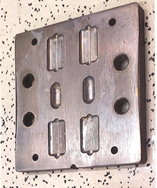Nano and Micro-Fiber-Bundle/Matrix Interface Strength Test Method: Custom Batch Sample Manufacturing Mold and Testing Fixture
- Pending
Adhesive and surface treatment technologies are crucial for the structural integrity of the composite parts. The interfacial shear strength (IFSS) reflects the load transfer efficiency between reinforcement and matrix. However, no current test can be performed quickly with statistically significant replications. As a solution, this invention embodies a horizontal mold and geometry matched testing fixture for manufacturing samples for the pullout test in large quantity batches. The open-face mold design can accommodate matrices with a wide range of viscosity and solves the problem of testing nanomaterial and micromaterial bundle interfaces using the same pattern. The effectiveness of sample manufacturing made of carbon nanotube (CNT) yarns and IM7 carbon fiber (CF) with three different polymer matrices was demonstrated in this work. The IFSS of each sample were recorded using a conventional tensile machine, and their surface morphology was evaluated with SEM images. Analysis of Variance (ANOVA) and Tukey's pairwise comparison tests demonstrated a significant difference in IFSS means when changing matrices on CNT yarn specimens but no statistically significant difference on IM7-CF specimens for the three matrices. This mold is expected to help researchers obtain faster results and study matrices that have not been thoroughly tested.
Advantages
The interface strength between matrix and reinforcement is challenging to quantify with meaningful statistic and data. The invention is a horizontal mold and geometry matched fixture for manufacturing samples for the fiber-bundle pullout test in large quantity batches. The fiber-bundle pullout test is a way to test the novel custom manufacturing mold and matching mechanical test frame fixture. The invention will manufacture large batches of samples in a wide range of matrix viscosity. The invention will also be able to test both nanomaterial and micromaterial bundle interfaces using the same mold. The invention also includes a geometry matched mechanical testing fixture to precisely fit the geometry of the manufactured samples and can be used in virtually any existing mechanical testing load frame.


